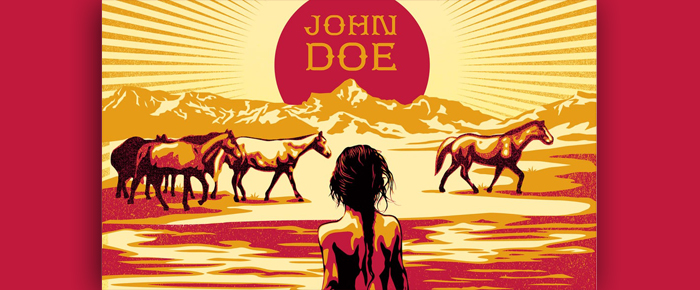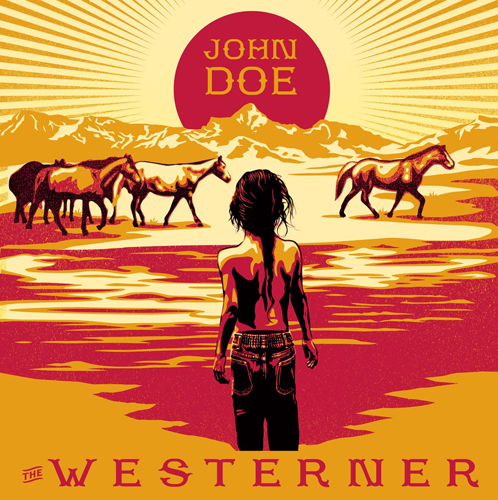
By Eleni P. Austin
Forty years ago Punk Rock snarled, scratched, spit and elbowed its way into the cultural zeitgeist. The popular mis-conception is the genre was created in London, England. But it’s truly and purely American idiom.
Proto-Punks like the MC5 and Iggy and The Stooges laid the groundwork in the late ‘60s, offering up a scuzzy antidote to Hippy-Dippy Flower Power. A few years later four guys from Queens formed the Ramones. Donning leather jackets and ripped jeans, they adopted the surname Paul McCartney famously used as an alias when he toured with the Beatles.
Their music wed sharp sketches of urban decay, (sniffing glue and turning tricks) with impossibly hooky two minute melodies that owed as much to Iggy as it did to Phil Spector.
A few months after the release of their self-titled debut arrived, the Ramones played a gig at the Roundhouse in London, England. In attendance that night were members of the Sex Pistols and the Clash. Seeing Johnny, Joey, Dee Dee and Tommy, spurred these nascent bands to adopt the same primitive approach. By the end of 1976 the English Punk scene had exploded.
Almost at the exact same time as Johnny Rotten and Joe Strummer were copping Joey Ramone’s stage moves and Johnny Ramone’s sped up, downstroke guitar style, Los Angeles was experiencing its own Punk Rock renaissance.
On the surface, mid ‘70s Los Angeles was still a bastion of sun, surf and mellow vibes. But beneath the sunshin-y crust was a sprawling metropolis, a melting pot of disenfranchised, dissatisfied denizens not living the California dream. Bands like the Germs, the Weirdos, the Plugz, Fear and X tapped into that dichotomy.
X came together when John Doe (ne’ John Nommensen Duchec) relocated from Baltimore and hooked up with protean guitarist Billy Zoom, (ne’ Tyson Kindell). Doe met budding poet, and Florida transplant Christine Lee Cervenka (soon to be re-christened Exene), at a poetry workshop in Venice. After they started dating, she began accompanying him to band practice. Soon, she joined the band as the primary vocalist. The line-up was complete when drummer D.J. Bonebrake left the Eyes.
X was one of the first bands signed to Slash Records, a fanzine turned label. Their seminal debut, Los Angeles, was released in 1980 and less than a year later they followed up with Wild Gift. Both were critically acclaimed, and X was quickly signed by the major label Elektra.
Two more albums, Under The Big Black Sun and More Fun In The New World arrived in quick succession. All four records were brilliantly produced by Doors keyboardist, Ray Manzarek. With his imprimatur, it felt as though he was passing the L.A. music torch to the next generation.
X’s music transcended the narrow confines of Punk. They expanded on the short, sharp nihilistic attack of their first two records, adding Roots-ier elements to the second pair of albums. Hints of Rockabilly, Country and Folk anticipated the Americana/alt.country movement by at least 10 years.
Their band’s lyrics, written by Doe and Cervenka tackled real life issues like poverty, drug addiction, politics and death. The couple had married in 1980, and their vocal interplay had the same frisson exhibited by George Jones and Tammy Wynette.
Despite critical plaudits, commercial success eluded the band. By 1985, John and Exene divorced, but continued their professional relationship. X switched producers for their fifth effort, the harder rockin’ Ain’t Love Grand. Their fortunes remained unchanged and Billy Zoom left the band.
Zoom was replaced, temporarily with Blasters guitarist, Dave Alvin and then more permanently with former Lone Justice guitarist, Tony Gilkyson. They released See How We Are in 1987, and an incendiary concert set, Live At The Whisky A Go-Go, before going on an extended hiatus.
X would return in the ‘90s, recording a final studio album, Hey Zeus! in 1993 and a live acoustic collection, Unclogged a couple of years later. Toured sustained them, and by the end of the 20th century, Billy Zoom rejoined the band and the original line-up has been on the road ever since.
When X isn’t touring, the band members have all remained busy with solo albums and side projects. John Doe began an acting career in the late ‘80s, creating a second career as a credible character actor. He has 65 credits to his name, from the ridiculous (“Slam Dance,” “Road House”) to the sublime, (“Border Radio,” “Georgia,” “Boogie Nights,” “Good Girl”).
Between 1990 and 2011 he recorded eight solo albums of heartbreak and introspection. He also found time to make a covers album with the Sadies and duet-heavy efforts with Jill Sobule and Exene Cervenka. 2014 saw the release of his 21 song career retrospective, The Best Of, This Far.
 Now, not only has John Doe written a memoir, “Under The Big Black Sun: A Personal History Of L.A. Punk,” but he’s also returned with his first solo effort in five years, entitled The Westerner. The record kicks into gear with “Get On Board.”
Now, not only has John Doe written a memoir, “Under The Big Black Sun: A Personal History Of L.A. Punk,” but he’s also returned with his first solo effort in five years, entitled The Westerner. The record kicks into gear with “Get On Board.”
The song is powered my urgent, aerodynamic bass lines, meandering guitar, a spooky organ wash and an ever-accelerating locomotive rhythm. The lyrics offer a tart metaphor for life; “There’s all kinds of people on this train, but there’s no VIP or platinum reserved, ‘cause everybody’s on this train/There’s a mountain pass and a straightaway, there’s a water stop on a rainy day, we gotta get on board this train.”
The secret weapon behind X’s appeal has always been the vocal interplay between John and Exene. His rough-hewn baritone has always seemed more tender when he brushes up against a distinctly distaff energy.
On “A Little Help,” he’s joined on the chorus by Chan Marshall, (better known by her nom de Rock, Cat Power). A contemplative track, it relies on graceful piano notes, subtle Hammond B3 and a high lonesome pedal steel. The lyrics send a plea to a spiritual benefactor; “Help me, help me, everybody needs a little help/Not all the time, or every day, just need a little help today.”
“Go Baby Go” is a throbbing slab of Psychedelic Garage Rock, anchored by a pile-driving backbeat, pounding piano chords, slashing guitar and boomerang bass. Doe receives a fiery vocal assist from the Ice Princess of Punk, Debbie Harry. The lyrics feel like a sideways homage to his second wife, Gigi Blair, and their enduring union. “You’re a hummingbird, you breathe so fast, Your lungs are full, your lips are glass/Your wings so thin, work so hard/As I kneel down in our backyard.”
It’s kind of surprising that John Doe has never tried his hand at fiction. His deft and economical approach to storytelling echoes the cogent prose of other L.A. transplants like Nathanael West, John Fante, Charles Bukowski and James M. Cain. His novelistic approach is evident on the album’s best tracks, “Sunlight” and “Sweet Reward.”
The former is propelled by dusty percussion and courtly Spanish guitar. With just a few lines, Doe manages to sketch out a harrowing tale of childhood neglect and a lifetime trying to out run the lingering demons. “At 22 he changed his name, he tried to suffocate in a Hollywood bed, he tried to starve in an L.A. barroom he tried to bury his words with words.”
The latter paints a vivid portrait of a transient guy (maybe the same kid from “Sunlight”) fresh from incarceration, still searching for a soft place to land. Spare acoustic guitars lattice lyrics that recount redemption; “She talked to him quietly, and looked him in the eye and said, ‘You can stay as long as you like’/…She got him a job fixing cars for her uncle, he liked getting dirty and then getting clean/And when he laid down at night and and held to her hand he thought ‘this is my sweet reward’.”
Although it’s been 23 years since X has released any new music, John Doe and Exene still co-write songs together and the results often pop up on their separate solo efforts. Here they collaborated on the rollicking “Drink Of Water.”
A thumping backbeat collides with roiling bass runs, swirly, psychedelic organ and shapeshifter guitar licks that pivot from parched to fuzzy to stinging. The stream-of-conscious lyrics provide some potent imagery; “Got a box of water, a liquid souvenir/ Now it’s raining blackbirds piled up at the back door like the constellations they don’t stay up in the sky.”
The most heartfelt track here is the Exene composition “Alone In Arizona,” a classic Country weeper that is cloaked in the shimmery Southwest heat. Guitars shudder and sparkle, salty accordion notes snake around prickly bass lines. Here John effortlessly slips into the skin of an estranged husband yearning to reconnect with his family, repeating the chorus, “my heart’s in California, I’m alone in Arizona,” like a mantra.
Other interesting songs include the melancholy marital lament of “The Other Shoe” and “My Darling, Blue Skies.” “My Darling…” weds gunslinger guitar licks to a sandblasted Bo Diddley beat. The urgent music is matched by a pointed commentary on our overly caffeinated society.
The album closes with “Rising Sun.” The melody begins quietly, as the lyrics unfurl a lonesome haiku. John’s subdued croon cradles lyric like “in his dreams, he still dreams.” The instrumentation slowly builds adding a clickity-clack rhythm, stately piano and ghostly pedal steel.
Hazy organ notes ratchet up the tension, as layers of guitars salt the mix, there’s a clangorous instrumental break before the tune concludes with just his voice and a tinkly wind chime. It’s a dusty denouement to an epic song.
Produced by the legendary musician Howie Gelb (Giant Sand, The Band Of Blacky Blanchette, OP8) The Westerner was recorded in Tucson and Hollywood and features contributions from Tom Brousseau, Ryan Feves, Connor Gallaher, Eric Heywood, Stuart Johnson, Thoger Lund, Val McCallum, Ernie E. Mendoza, Jamie Muhoberec, Gabriel Sullivan and Dave Way. Cindy Wasserman is definitely the album’s MVP, playing and singing on almost every track.
The album was inspired by John Doe’s longtime friendship with Poet/Author Michael Blake. He was best known for winning an Academy Award for adapting his “Dances With Wolves” book into a hit Hollywood movie. Sadly, he passed away in 2015 after a long illness. The evocative cover art comes from Shepherd Fairey, Aaron Huey and Jim Herrington for Honorthetreaties.com.
John Doe’s solo output has been consistently wonderful, but the new album reaches even greater heights. The Westerner is as close to perfect as it gets.










































